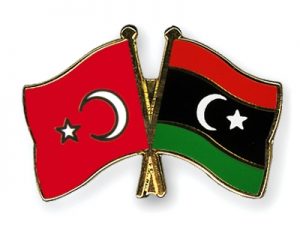By Sami Zaptia.

London, 8 July 2020:
The internationally recognized government of Libya in Tripoli held a meeting yesterday to discuss the return of Turkish companies to Libya to resume their stalled projects.
The government statement said that the meeting, headed by prime minister designate Faiez Serraj and his Planning Minister, discussed Libya’s stalled infrastructure projects contracted to be implemented by Turkish companies which were not completed due to the ‘‘exceptional circumstances’’ that Libya has experienced since the 2011 revolution that ended the 42-year Qaddafi regime.
The report said that electricity and energy projects, in addition to new projects that will contribute to the provision of effective and rapid services to the Libyan citizens, were highlighted.
Serraj was reported to have stressed the importance of resuming work on stalled projects and that this return should be the starting point for a deliberate and balanced partnership between the two friendly countries involving the private sector in Libya.
Analysis
It is unclear, however, how genuine and realistic it is that Turkish, or any other foreign contractors for that matter, are likely to be able to return to Libya and resume their stalled or new projects. It would take much political determination and coordination – which hitherto has not been evident. It would need special security measures to guard any foreign nationals during their return to work. It would be easier to execute this in coastal cities than in the interior.
It was worth noting that Libya has been in dire need of, for example, increased electricity supply, cooking gas supplies and fuel supplies since 2011 – yet despite promises over the years by foreign states to help – all Libya’s interim governments since 2011 have failed to solve these and other crisis.
Libya’s fundamentals since 2011 remain the same – if not worse. The very reasons foreign contractors and embassies left Libya still remain in place. Libya’s central, accountable security apparatus is still very weak and limited in size and reach. Libya’s militias still run the country and the kidnapping and embezzelment of foreign nationals still a possibility – with the central authorities being able to do little to mitigate against it.
Moreover, Libya’s state finances have deteriorated greatly since 2011. The collapse of international crude oil prices and the blockade on Libya’s oil production since January this year – means going forward the Libyan state will have minimal money to invest.
Libya’s stalled projects are estimated at over US$ 100 bn. The Libyan state will not be able to finance these for over a decade at current revenue rates. For political reasons, the Libyan government of the day may decide to favour contracts of one country or another – but the same fundamental problems remain true. A limited number of projects that are near completion and are vital and can secure quick returns to the state may be one way forward – if the security issue can be resolved.







